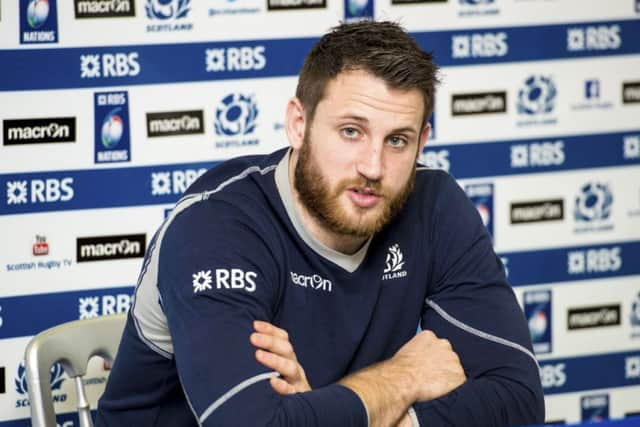Six Nations: Scots aren’t fragile, says Seymour


Tommy Seymour’s voice is an odd amalgam of influences but Texas, where he was born and spent the first nine years of his life, and Northern Ireland vie for primacy with the latter winning the vocal arm wrestle hands down.
Naturally enough for a youngster who played age grade rugby for Ireland and lived in Belfast, Seymour joined the
Advertisement
Hide AdAdvertisement
Hide AdUlster academy. But he still insists that he was as much influenced by the former Scotland winger Simon Danielli, who played for the province latterly, as anyone more local.


In fact, Seymour goes out of his way to underline his Scottish rather than Irish credentials, perhaps just a little too much.
“My family allegiance sides with where their boy plays his rugby,” he says when asked if any of his close relations would be sporting green on Saturday. “My mum and dad are very happy, very much enjoy supporting Scotland.
“When I was a youngster, yeah, obviously it was natural [to support Ireland], we were in Ireland. I hadn’t come across rugby until then, that’s when my entry point was and it would be unnatural for me to say that there wasn’t.
“I supported Ireland when I was growing up with the rest of my schoolmates and things like that. Obviously under-age representation was in there as well [he played for Ireland 19s] but my rugby allegiances have very much changed.
“I don’t find it hard [to switch allegiance], especially due to the way I was brought into it. I wouldn’t be afraid to say that I am very much a momma’s boy so to have the opportunity to represent the birthplace of my mum obviously means a lot to me. Coming over to Glasgow and having the year of it. Just playing for Glasgow and getting immersed in the Scottish culture and the Scottish way of playing.”
While Stuart Hogg rightly earned all the plaudits from averting the white avalanche in the opening quarter at Twickenham, Seymour also played his part. When Luther Burrell broke through early on, the winger recognised that he was covered but hared back to the left flank to cut off the outside pass to his opposite number Anthony Watson.
Seymour will be marking Tommy Bowe on Saturday, another Ulsterman but one who was playing his rugby for the Ospreys in Wales while the Scot broke into the Ulster academy. Both men are top-class players but it is probably fair to say that neither has so far managed to leave an indelible print on the current tournament. Seymour was injured early in the opener against France and missed the second match against Wales.
Advertisement
Hide AdAdvertisement
Hide AdUnder Joe Schmidt’s limited but effective kicking game, the Irish wingers have rarely caught sight of the ball unless it is hurtling towards them out of the floodlights.
The Championship has come down to the final round of matches with three teams able to lift the trophy, although Ireland will have to score a few tries on Saturday if they are to do so; the problem is that they may have forgotten how.
Of the four tries that Ireland have scored to date, only two have gone to backs and neither of them was the result of any great commitment to Barbarian-style running rugby. Scrum-half Conor Murray burrowed over from close range against Italy and Robbie Henshaw rose high above Andy Goode to claim a clever chip kick and score against England.
Ireland sit second in the overall table on points difference with four tries to their credit; Scotland are without a win but can still claim five.
“Ireland have won a lot of games,” replies Seymour when the tryscoring statistics are aired. “So I am not going to start questioning Ireland’s ability to score tries. They have a talented squad and they have won on a consecutive basis, on a very impressive basis, so it’s not for me to worry about or consider their ability to score tries.
“I have to focus on our ability to score tries and get points and that is my focus.”
The Scots will continue to give their young backs their head in the hope of ironing out a few last-pass errors that have blighted the game to date. The twin coaches may be adopting diametrically opposite tactics but the pair go a long way back. The duo probably know and respect each other more than anyone else alive and both have something to win – Joe Schmidt a second Championship in a row, Vern Cotter the dreaded “cuiller en bois” as the wooden spoon is known in France.
What do Scotland have to do to avoid lifting that dubious honour?
Advertisement
Hide AdAdvertisement
Hide Ad“We need to be realistic about doing the things we’ve done well in parts, in previous games, consecutively well over an 80 minute period,” replies Seymour.
“It is no good at international test level to play good 20 minutes or 30 minutes, it has to be 80 minutes. There is no let up.
“With the Mark Bennett try, everything we did from the lineout to the finish was perfect, the speed of ball, the lines of running, not allowing the defence to settle.
“We need to say: ‘Right, we have done that, it worked, let’s go again.’ Reset and repeat. We need to do that in order to win games and we have the ability to do it.”
FOLLOW US
SCOTSMAN TABLET AND MOBILE APPS